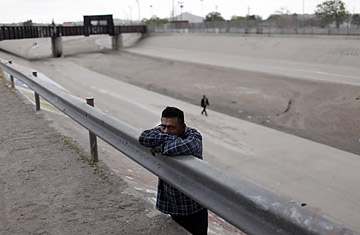
Mexican resident Jorge Perez stands on the dry bed of the Bravo River on the Ciudad Juárez side of the U.S.-Mexico border
On the once thriving Revolution Avenue that runs through this unwieldy border city, Oscar Rivera eyed a solemnly empty store of sombreros and ponchos. Amid a global recession and drug war that is terrifying American visitors, business has nose-dived, Rivera says, falling a staggering 85%, compared with last year. "I've made $2 today. That is one dollar for me and one for my assistant. How can we live on that?" he asks. "This is what President Barack Obama has got to look at when he comes to Mexico. We have got to work together with the United States to get out of this."
As Obama arrives for his first presidential visit to Mexico, many from the nation's southern jungles to its northern deserts are hoping the U.S. leader will bring some of his contagious optimism. Since opening up its economy in the 1990s, Mexico has become increasingly entwined with its northern neighbor, sending the U.S. 80% of its exports, 400,000 migrants and an estimated $30 billion worth of narcotics every year. But in the past 12 months, this special relationship has been seen as more blight than blessing, with falling remittances, tumbling trade and an increasingly bloody war over the north-bound drug business. Many here are looking for the U.S.'s new and novel leader to revive the North American partnership. (See pictures of Obama's trip to Europe.)
Nowhere is this bilateral relationship more apparent than in Tijuana, the busiest border crossing on the planet. A giant launching pad for migrants, center for U.S.-owned assembly plants and strategic front in the drug trade, the city of 1.6 million has long enjoyed the best and worst of living next door to the U.S. colossus. However, that relationship has soured in recent months with news of a bloody cartel turf war that has scared many Americans away from even stepping foot in Tijuana. (See pictures of Mexico's war on drugs.)
Some here fault the U.S. for buying all the cartels' drugs, then seemingly abandoning Mexico. "Obama needs to work on stopping all the American drug users. That is where the problem is," says Antonio Santiano, sitting in an empty shop of arts and crafts near the U.S. border. "And he needs to tell his people it is all right to come to Mexico. If he is coming for a visit, why can't all the other Americans?"
Obama's visit has a little more security than that of most U.S. tourists. Amid almost 8,000 drug-related murders here since January 2008, more than 4,500 Mexican police are being sent out to protect Obama in the few central Mexico City locations he will visit. He is not scheduled to step onto the streets but to move in a helicopter and special bulletproof limousine known as "the Beast." (See pictures of the Great Wall of America.)
In the Tijuana security services, officials welcome Obama for pledging to stand shoulder to shoulder against the drug gangs. Deputy Attorney General Salvador Ortiz says U.S. aid would be a valuable asset in fighting the gangs. He also says it would be useful to have U.S. agents work more closely in the training of Mexican police and prosecutors, a marked change from the aggressive nationalism long held by many Mexican officials. "It is positive for us to move toward a more American-style system of law enforcement," Ortiz says. "And to do this, it is constructive to have U.S. agents sharing advanced techniques of evidence-gathering and investigation."
The city's tourist officials are also championing Obama's vocal position on the drug trade. "He has taken the big step in recognizing that America has a major responsibility in this fight," says Jahdiel Vargas, director of Tijuana's Tourism and Conventions Committee. "He has been much clearer about this than previous U.S. Presidents." Obama has promised to step up efforts to stop guns and drug money from heading south and to increase direct aid to Mexico in the fight against the cartels.
However, not everyone is counting on Obama to save Mexico from the wrath of the drug armies. Victor Clark Alfaro, director of the Binational Center for Human Rights, said the Administration's efforts to stop U.S.-sold guns from getting to Mexico are futile, unless the weapons are banned in shops — a move U.S. officials have shied away from. "If the entire border-patrol service cannot stop tons of drugs and millions of migrants heading north, how will a few hundred U.S. agents stop all the guns coming south?" he asks.
Clark says the real power of the cartels is corruption, a problem the U.S. President can do little to stop. "Obama cannot offer very much," says Clark. "This is not a question of hardware. We can have hundreds of Black Hawk helicopters, but this will not stop the cartels as long as they keep bribing large amounts of police and soldiers. We have to deal with the issue of corruption by a major change in our political culture. This is our problem."
See pictures of Culiacán, home of Mexico's drug-trafficking industry.
